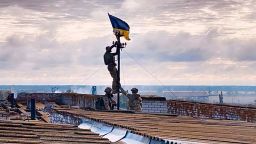Deputy Permanent Representative of Ukraine Khrystyna Hayovyshyn attends the UN Security Council's emergency meeting at the United Nations Headquarters in New York City, U.S., on September 7.
(David 'Dee' Delgado/Reuters)
Torture and the forcible deportation of 2.5 million people were among the shocking details of human rights violations against Ukrainian civilians recounted at a meeting of the UN Security Council on Wednesday.
Deputy Ukrainian Ambassador to the UN Khrystyna Hayovyshyn told the council that 2.5 million people, including 38,000 children, have been forcibly deported from the country under a Russian “filtration” program.
The UN Office of the High Commissioner for Human Rights (OHCHR) has also documented “filtration” cases, it said. During these cases, “Russian armed forces and affiliated armed groups have subjected persons to body searches, sometimes involving forced nudity, and detailed interrogations about the personal background, family ties, political views and allegiances of the individual concerned,” according to Ilze Brands Kehris, United Nations Assistant Secretary-General for Human Rights.
Brands Kehris said there have been credible allegations of forced transfers of Ukrainian children to “Russian occupied territory, or to the Russian Federation itself.”
“We are concerned that the Russian authorities have adopted a simplified procedure to grant Russian citizenship to children without parental care, and that these children would be eligible for adoption by Russian families,” she added.
Ilze Brands Kehris, Assistant Secretary-General for Human Rights, speaks virtually during a U.N. Security Council meeting to discuss the war in Ukraine at the United Nations Headquarters, New York City, US, on September 7.
(Michael M. Santiago/Getty Images)
In addition, Brands Kehris said that men and women “perceived as having ties with Ukrainian armed forces or state institutions, or as having pro-Ukrainian or anti-Russian views” being subjected to torture, arbitrary detention, and “enforced disappearance.”
Russian officials said the allegations of forced “filtration” are unfounded, adding that newcomers to the country go through “registration,” not filtration.
Refugees and displaced persons in Russia are given health and financial assistance, Russian Ambassador to the UN Vassily Nebenzia said in his remarks to the UN Security Council Wednesday.
It’s very unfortunate that human rights groups are making unfounded allegations against Russia, Nebenzia said. “We have wasted time” discussing this issue rather than real issues, the ambassador added.
Meanwhile, Rosemary DiCarlo, UN Under-Secretary-General for Political and Peacebuilding Affairs said that over 6.9 million people remain internally displaced in Ukraine, with most of the newly-displaced coming from eastern and southern Ukraine.
There have been 5,718 civilians killed, including 372 children, and 8,199 injured, including 635 children, during the war so far, she said.
DiCarlo added that “these are only verified figures and the actual numbers are likely significantly higher.”






















